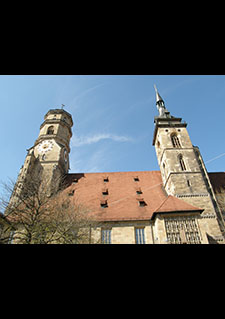Church President and Regional Bishop, 1933
An exponent of the conservative school of thought, Theophil Wurm was elected bishop of the Württemberg regional church on June 13, 1929. In the face of the difficult economic, political and social situation in the early 1930s, Wurm believed that Germany only had the choice between a red dictatorship and Hitler’s movement – especially since the National Socialists had also adopted a position against the anti-church remarks from the associations of freethinkers.
Wurm considered the National Socialists to be a movement that could lead to new stability and unity. Wurm was skeptical of the German Christian groups forming in Württemberg but willing to work together conditionally. He especially shared their commitment to extensive national evangelization since the new circumstances raised hope that the church could win back alienated segments of the population.
This is emphatically expressed in a keynote address Wurm delivered at the clergy association’s assembly on April 19, 1933:
Some things happening today are making the pastor’s work easier: some doors are open wider than before. Other things are making it difficult; even today, many heavy burdens have to be borne. Fully determined, the church, as I already stated several times, is readying itself for the tasks, which the present is presenting our state and nation. Many of us suffered severely for decades as long as Marxism nearly entirely dominated the thinking of the German working class, advocating the essentials of nation and fatherland was interpreted as disdain for, even as hostility toward the rise of the working class. Today, this impression has been eliminated; today, May 1 is no longer symbol of the class struggle but rather of the true community of all classes sharing in a common labor and destiny. The thanks for salvation from impending grave danger and the joy that the new state sees and is tackling tasks related to the nation’s inward and outward health, to which we admonished the state of the prewar and postwar period to no avail, is thus outweighed by concern whether the pace of much-discussed Gleichschaltung is not accelerating far too quickly. At any rate, I believe I have to stress over overzealous press statements, which do not always report the facts accurately, that the Protestant church is not a regional health insurance company, which has to be restored to profitability (Schäfer 1, p. 327f.).
The changed circumstances soon had concrete impacts on the regional church, too: On May 15, 1933, the standing committee of the regional church congress had authorized Wurm with an ecclesiastical “enabling act” to take measures that appeared necessary, even without the regional church congress. As a concession to the German Christians, who were pushing for a reorganization of the church, one of their representatives Wilhelm Pressel was admitted to the high consistory on June 1. The new situation was also manifested in the offer made to Wurm on June 30 to use the title “regional bishop” in the future.
The church elections scheduled for July 23 by the Nazi state after the new Protestant church constitution had been adopted were circumvented in Württemberg: Wurm had worked to get the various factions to agree to form the new regional church congress, reserving a – slim – majority for the German Christians. With the new title and the regional church congress dominated by German Christians, the church in Württemberg had assimilated the Nazi regime’s authoritarianism.
Even nationally, Wurm was willing to make allowances for the given circumstances. When an animated debate about the character of a future Reich Bishop broke out at the end of May, Wurm opposed the Young Reformation movement’s candidate, Friedrich von Bodelschwingh, and supported the Führer’s “representative”, Ludwig Müller, who had been nominated by the German Christians. Wurm preached the sermon at the worship service opening the national synod in September, which elected Müller Reich Bishop.
Source / title
- BuzzWoof, public domain

